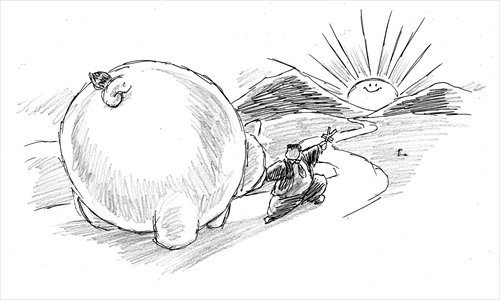HOME >> BUSINESS
IMF reform deal recognizes China’s new status
By Song Guoyou Source:Global Times Published: 2015-12-23 20:38:01

Illustration: Peter C. Espina/GT
The IMF announced recently that its 2010 quota and governance reforms had finally been approved by the US Congress, so the five-year-old deal is expected to take effect soon. According to the plan, China's share of voting power in the IMF will be increased to 6.394 percent from the previous 3.996 percent, ranking third among the fund's 188 member countries.
There are three aspects of ratification of the IMF reforms that are of particular significance for China.
First, China previously agreed to increase its contribution to the IMF to expand the latter's emergency funds on condition that the quota and governance reforms agreed to in 2010 were completed. The latest move shows China's call for completion of the quota reform has finally been answered. The 2010 quota reforms agreed to give emerging countries including China more voting power in the fund if these countries increase their funding for the IMF. China pledged to provide an extra $43 billion to the IMF in 2012, and part of that funding has already arrived through various channels even before the implementation of the quota and governance reforms. Now that the reforms have been approved by the US Congress, the increased funding from China has also achieved the expected outcome of increased influence.
Second, it signifies that the orderly and fair reforms China has promoted in the international financial system at a gradual pace have seen genuine progress. There are still problems in the current international financial system and changes are urgently needed. Instead of pursuing a disruptive path of reform, China has chosen an incremental reform path, through which it hopes to assist the IMF and play a leading role in international financial governance. The delay by the US in approving the IMF reforms had once prompted doubts about whether China's incremental reform was the right path. But the approval of the deal, together with the yuan's inclusion in the Special Drawing Rights (SDR) basket of international reserve currencies, has eased such fears.
Third, ratification of the reform illustrates that China's new status in the international financial system has also been recognized, and that China will be allowed to play a bigger role in international financial governance. The quota and governance reforms will boost the IMF's quota resources from $329.8 billion (SDR 238.5 billion) to $659.7 billion, as well as giving China more voting power. This will enhance China's influence in the IMF, place a steady foundation for the yuan's internationalization, and help China to expand its status in international finance.
For China, the implementation of the 2010 IMF reforms not only serves as a fresh start to receive the financial rights in the international community that it deserves; it's also a fresh start for the nation in terms of the need to practice its international financial responsibilities.
Even though it has only just been ratified, it is obvious that the 2010 plan is lagging behind the international economic reality, and it can't fully reflect the status of emerging economies and developing countries. Even though China's share of voting rights has increased, China should unite other emerging economies and developing countries to boost reforms in a gradual manner with the aim of moving toward more orderly and fair development in the international financial system.
Besides pushing forward the IMF reforms, China should join with developed economies in strengthening the IMF's capability to deal with crises and enhance its internal governance ability to help maintain the sustainable growth of the world economy. In the new era, reform and development should go hand in hand, and they are the greatest responsibilities China should shoulder in the international financial system.
Lastly, even though the IMF is at the core of the international financial system, there are other vital aspects of the system. China should take advantage of its own resources to continue to build up regional multilateral financial institutions such as the Asian Infrastructure Investment Bank, and make it a new pillar of strength in the global financial system.
The author is director of the Center for Economic Diplomacy, Fudan University. bizopinion@globaltimes.com.cn
Posted in: Expert assessment